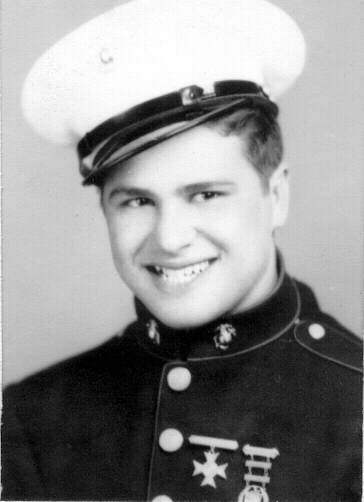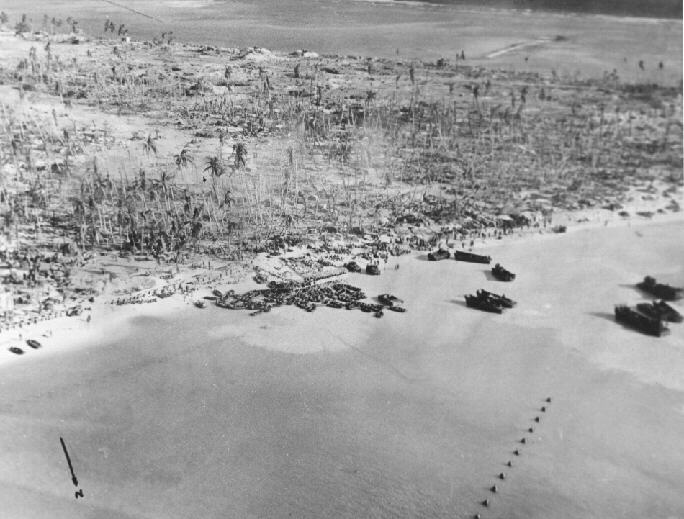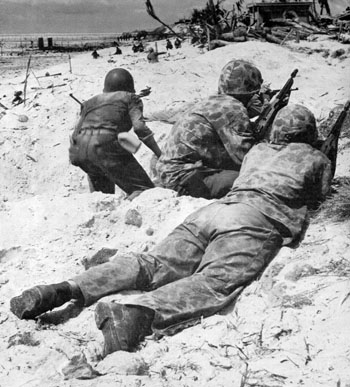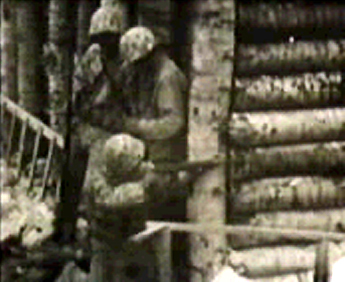"My Personal Experience on Tarawa"

Little did I know when I enlisted in the Marine Corps, November 20, l942, that exactly one year to the day, I would be engaged in a battle destined to become one of the most legendary battles in the Marine Corps history.
Even after 55 years, certain events that took place during the invasion of Tarawa still remain very vivid in my memory. As an artillery radioman with the 1st Battalion, 10th Marine Regiment, 2nd Marine Division, the original plan was that our battalion follow the third wave of infantry into Red Beach 2 and set up the 75mm battery positions.
I spent a sleepless night, except for a few catnaps, the night before the invasion, as I suppose everyone else did. I kept thinking of my loved ones back home, and wondered if I would ever see them again. I recall having a very vivid dream of my mother. She was holding a large white candle in each hand and praying that both her sons return home safely. My brother was also in the Marines stationed on Midway Island. Later mail correspondence revealed that my mother did in fact attend a church memorial service and lighted two candles on the evening of November l9, l943.
It became apparent the original plan went awry as we traversed the ocean waters surrounding the lagoon for almost 30 hours in a Higgins boat attempting to make a landing. I became so sick from the constant wave motion and diesel fuel exhaust that I developed the dry heaves and started spewing blood. I finally reached a mental state that I welcomed the opportunity to get off that damned boat regardless of the outcome.
On D+1, during high tide, we disembarked at the end of the pier. Advancing on the pier deck was ruled out due to diagonal crossfire from Red Beach 3. A large rope was strung in the water from one end of the pier to the other to assist us in keeping our head above water, since we were loaded with full packs and heavy equipment. I was shorter than the average and the water hit me at neck level. As we progressed beachward, we started drawing sniper fire from an old derelict hulk stranded in the lagoon. I felt a sharp thud but luckily the bullet hit my radio and glanced off.
I witnessed the first Marine casualty lying on the pier deck and being attended by a corpsman. I couldn't believe he was still alive talking to the corpsman with a hole in his lower back as big as a softball.
I started sinking lower and lower as my equipment became saturated with salt water. I sarted bobbing up and down to catch my breath. I began to feel dead bodies underneath my feet and experienced a guilt feeling when I had to step on these dead bodies to keep my head above water.
We finally reached the beach and you couldn't crawl in any direction without crawling over dead bodies. I seemed almost defenseless when I discovered that my carbine was corroded with salt brine and wouldn't fire. The only thing I could rely on was my kabar knife. We expected a counter attack that night, but everything seemed pretty quiet except for a Jap bomber circling overhead for what seemed like hours, trying to harass us before dropping its load. How could it miss me on such a tiny island, I felt like a giant on a sand pebble.
On D+2, I recall the battery crew had to dig down to lower the muzzle just above ground level. This was necessary in order to eliminate the normal trajectory of a 75mm pack howitzer and fire directly on such a short piece of real estate. The primary objective was to destroy the Japanese Command Post, a heavily reinforced concrete blockhouse with walls 3 to 5 feet in thickness. The shelling proved ineffective and the command post was finally put out of commission by stuffing the entrance with TNT, which provided an opening for the use of flame throwers.
That evening as I was digging my fox hole. I was startled when I felt a hand clutch my shoulder. I looked up to see General Julian Smith, commander of the 2nd Marine Division. He didn't say anything to me, he just smiled as if to say, "I believe we've got things under control".
Even though the island was secured the next day, my memories of seeing so many young Marines strewn all around the island and beaches, mortally wounded, never to see their loved ones again, got to me. I felt remorse that their mother's prayers were not answered.
See Gus's website for more information about his service with 2nd Marine Division in WWII




Send an Email:
copyright 2004 T.O.T.W.
Created 4 October 2004 - Updated 9 June 2004

Return to Index